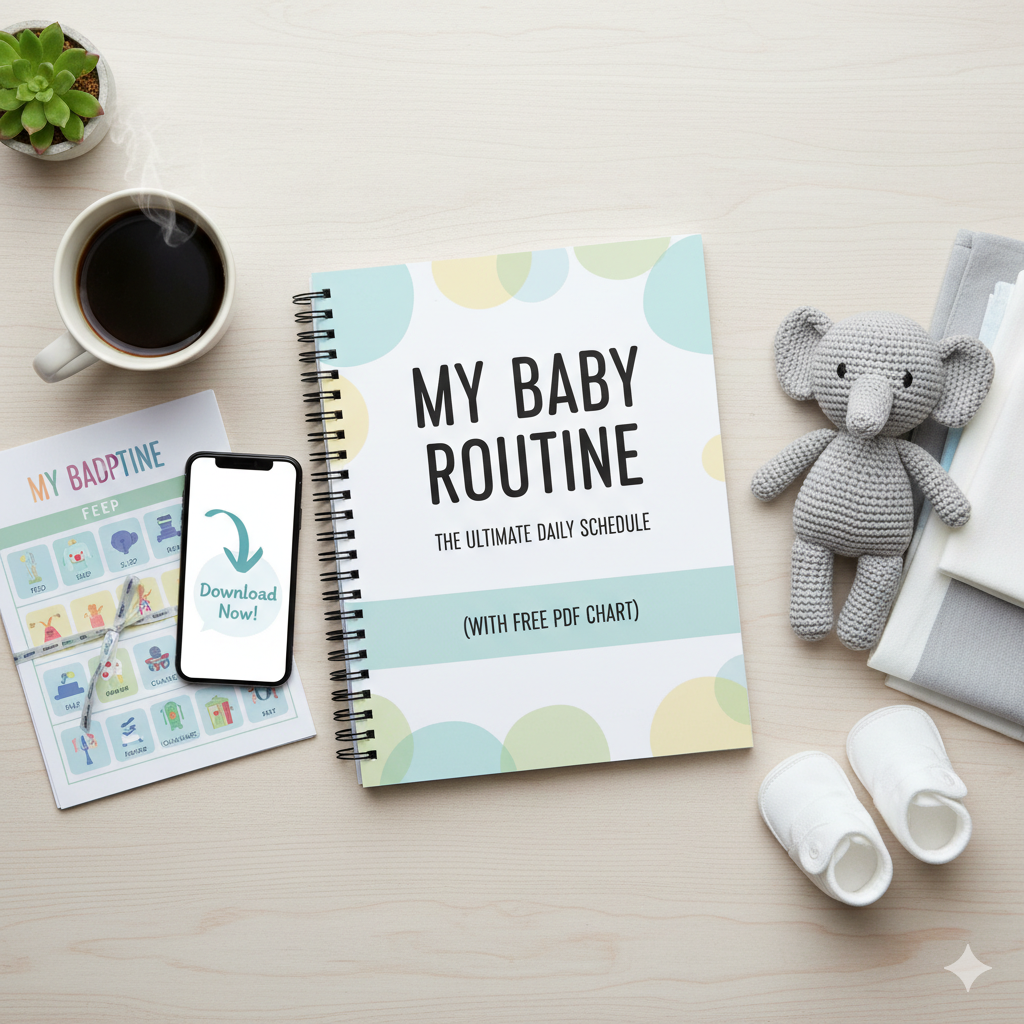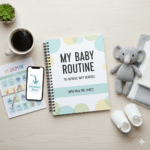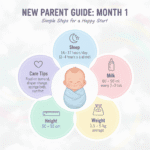Introduction: Why Every Baby Needs a Routine
Parenting is a beautiful journey, but it comes with its challenges—especially during the first year. One of the most common issues new parents face is irregular feeding, sleep, and play schedules. A well-structured baby routine helps your child feel secure, ensures proper growth, and gives you, as a parent, some peace of mind.
A baby routine is not about rigidity; it’s about creating predictable patterns for feeding, sleeping, and playing that your baby can trust. From newborns to toddlers, having a schedule can improve sleep quality, reduce fussiness, and help your baby achieve developmental milestones faster.
Key Benefits of a Baby Routine
- Better Sleep for Baby and Parents – Regular naps and bedtime help regulate your baby’s internal clock.
- Healthy Growth & Development – Consistent feeding times ensure proper nutrition and digestion.
- Emotional Security – Babies feel safe when they know what to expect next.
- Stress-Free Parenting – You’ll spend less time guessing when your baby will eat, nap, or play.
- Developmental Stimulation – Scheduled playtimes encourage learning, motor skills, and social interaction.
My Baby Routine: A Complete Daily Schedule
Here’s a practical baby routine table you can follow based on age. It’s designed for 0-12 months, keeping in mind feeding, naps, playtime, and night sleep.
| Baby Age | Wake Time | Feeding Time | Nap Schedule | Playtime | Night Sleep |
|---|---|---|---|---|---|
| 0 – 3 Months | 6:00 AM | Every 2–3 hrs (Breast milk / Formula) | 4–5 Naps (30 min–1.5 hr) | 15–20 min Tummy Time | 9:00 PM to 6:00 AM (with 2 feeds) |
| 3 – 6 Months | 6:30 AM | Every 3–4 hrs | 3–4 Naps (45 min–2 hrs) | 30–45 min Playtime | 9:00 PM to 6:00 AM (with 1–2 feeds) |
| 6 – 9 Months | 7:00 AM | 3 Solids + Milk Feeds | 2–3 Naps (1–2 hrs) | 1 hr Play + Toys Time | 8:30 PM to 6:30 AM |
| 9 – 12 Months | 7:00 AM | 3 Solids + 2 Milk Feeds | 2 Naps (1–1.5 hrs each) | 1–2 hrs Play + Learning Activities | 8:00 PM to 6:30 AM |
Detailed Routine Explanation
0–3 Months
- Feeding: Newborns feed every 2–3 hours. Breast milk or formula provides all the nutrients they need.
- Sleep: Babies sleep most of the day, usually 14–17 hours. Short naps are normal.
- Play: Gentle tummy time and soft interaction help strengthen neck muscles and stimulate sensory development.
3–6 Months
- Feeding: Introduce longer stretches between feeds. Some babies may start showing readiness for solids toward the end of this period.
- Sleep: Naps consolidate into longer periods, and nighttime sleep starts stabilizing.
- Play: Introduce soft toys and interactive games like peek-a-boo.
6–9 Months
- Feeding: Babies eat 3 small meals along with milk. Introduce textures and small finger foods.
- Sleep: 2–3 naps are usually enough. Night sleep may extend up to 10–12 hours.
- Play: Encourage crawling, sitting with support, and sensory play. Reading aloud helps language development.
9–12 Months
- Feeding: Offer a balanced diet with solids, milk, and healthy snacks.
- Sleep: Two naps per day, night sleep consistent. Some babies may need slight adjustments based on growth spurts.
- Play: Focus on motor skills, problem-solving toys, and early social interaction.
Tips for Following a Baby Routine
- Be Flexible: No routine is perfect. Adjust according to your baby’s cues.
- Create a Sleep Environment: Dim lights, soft music, and comfortable temperature improve sleep quality.
- Watch for Hunger Cues: Feed your baby when they are hungry, not strictly by the clock.
- Consistency is Key: Predictable routines help your baby develop healthy habits.
- Document & Track: Use a baby chart to track feeding, naps, and play. This helps identify patterns over time.
Free Downloadable PDF Baby Routine Chart
We understand that keeping a printed copy handy is extremely helpful for parents. That’s why we’ve created a PDF chart version of this baby routine. You can download it, print it, and place it near your baby’s crib or feeding area.
📥 Download My Baby Routine PDF-1 Chart Here
FAQs – My Baby Routine
Q1: When is the best time to start a baby routine?
A: You can gently start a routine from the first month. Newborns are flexible, and a light schedule helps parents stay organized.
Q2: My baby wakes up at night. Is that normal?
A: Yes, night waking is common in the first 6–9 months. Gradually, with a consistent routine, sleep improves.
Q3: Can I adjust the routine if my baby refuses naps?
A: Absolutely. Every baby is different. Try quiet play or shorter rest periods instead of forcing sleep.
Q4: Is tummy time necessary?
A: Yes, it strengthens neck, shoulder, and core muscles, which are essential for crawling and walking.
Conclusion
Creating a My Baby Routine is not about following the clock strictly; it’s about building a structured, loving environment where your baby can thrive. With consistent feeding, sleep, and play schedules, you can ensure your baby grows healthy, happy, and emotionally secure.
Download the free PDF chart and start your baby’s journey toward a smooth, predictable routine today.





